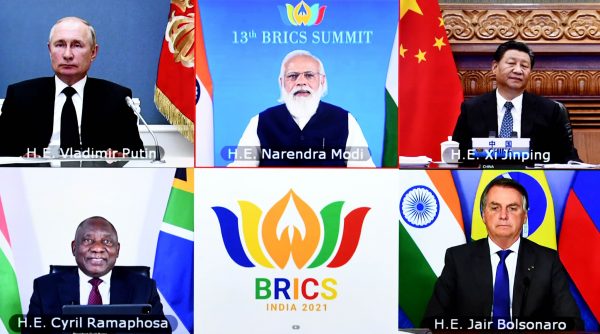Belarus’s application to join Brazil, Russia, India, China, and South Africa (BRICS) grouping amid New Delhi’s resisting the group’s expansion and Pakistan’s accusation of India blocking its participation in a BRICS-related meeting has shone the spotlight on New Delhi’s role which is perceived to be acting with a Western ’tilt.’
India and the opposing camps view the other as ‘PRIC,’ so to say, in the other’s divergent foreign interests.
According to a report in RIA Novosti, Belarus applied in May in an “absolutely logical decision in the context of…expanding cooperation in multilateral formats with traditional partners and friendly states.”
Meanwhile, in late June, Pakistan accused India of trying to isolate it internationally by blocking its participation in a side event to the upcoming BRICS summit. Islamabad and other countries, therefore, perceive New Delhi as not being completely invested in advancing the interests of developing countries owing to its “tilt” towards the West.
India only diverges with the G7 (US, UK, France, Germany, Italy, Japan, and Canada) on the sanctions over Russia and the war in Ukraine, where it fiercely guards its traditional relationship with Moscow.
But observers point to how the developing and underdeveloped world perceives India as not fully committed to advancing an alternative global eco-political order as it remains opposed to reconciling with Beijing and Islamabad. This naturally benefits Washington, which has had complicated and tense relationships with these countries and is locked in a fierce strategic rivalry with the former.
Once seen as a loose association of diverse emerging economies, BRICS – aimed at promoting peace, security, development, and cooperation – represents 43 percent of the world’s population, 26 percent of its land area, and about 30 percent of the global economy.
At the BRICS summit next month in Johannesburg, contenders to join the bloc includes Argentina, Egypt, Indonesia, the United Arab Emirates, Saudi Arabia, Algeria, Bangladesh, and Iran.
Expanding The BRICS Grouping
According to a report in the South China Morning Post (SCMP), China had been planning to start working on admitting new members. However, Indian Foreign Minister Subrahmanyam Jaishankar said last month that the process was still a “work in progress.”
Jaishankar cited the need to deliberate on standards, criteria, and procedures for admitting new members.

While the report clarifies that India is not the only one resisting expanding the bloc, India is particularly “wary” of the plan. The news came following the commencement of a three-day meeting involving senior officials earlier this month, where the “expansion proposal (was) expected to be on the agenda.”
SCMP quoted Anu Anwar, a fellow at Harvard University’s Faculty of Arts and Sciences, saying India’s recent tilt towards the West suggested it was an “outlier” in BRICS, which “makes sense” for other members to want to expand the bloc.
In recent times, Delhi has strengthened defense and technological cooperation with the US, Japan, Australia, and the European Union and has played an active role in the Quad security grouping, mainly by producing vaccines for the Indo-Pacific region.
Why The Interest In BRICS?
External Affairs Minister S. Jaishankar or MEA officials have not articulated their reasoning on how they view the membership criteria in BRICS should be formulated.
But an article in Modern Diplomacy indicates that it is essentially a debate between a country’s economic contribution to the region, its size, cultural influence, and how well they represent the region. Moreover, the balance has to be sought between equally representing the Global South continents of Asia, Africa, and South America.
Broadly, the surge of interest in the BRICS is a part of a larger paradigm shift of power from the US and West to the East, represented by China’s rise. Affected by the war in Ukraine, where developing and under-developed nations officially remained neutral on Moscow and did not condemn its military operation, the motivation towards joining BRICS was primarily economic and not to diplomatically or militarily isolate the West.
The prospect of the US weaponizing the dollar through sanctions and repaying foreign debt, becoming costlier owing to the currency’s appreciation following the Federal Reserve’s hiking interest rates, had led to countries exploring alternative currencies in settling their trade payments and in international credit.
The heavy multi-billion dollar high-interest loans offered by China’s Belt and Road Initiative (BRI); the existence of the BRICS’s New Development Bank (NDB) that granted loans worth $33 billion to more than 96 projects within the five founding countries and; avoiding the exacting conditions (caps on public spending, austerity measures, etc.) by the International Monetary Fund (IMF) in availing bailout packages, as was evident from the crises in Sri Lanka and Pakistan, generated interest in the alternative politico-economic power structure pushed by Russia and China.
The effort by the bloc to introduce a new gold-backed currency was a step in this direction. But here, too, while South African ambassador to the BRICS, Anil Sooklal, clarified that the currency issue is not on the agenda in the upcoming summit, experts expressed shock at India’s statement that it does not favor a BRICS currency.
‘India Blocked Us From BRICS Side-Event’
On June 26, Pakistan accused India of another ‘PRIC’ by India. Without naming the country, it said how “one member” of the BRICS grouping blocked its participation in a virtual meeting held on the sidelines of the bloc’s recent summit hosted by China.
This was during a high-level dialogue on global development as a side event at the upcoming 14th BRICS summit.
While several developing/emerging economies were invited, Pakistan alleged that “one member” of the BRICS grouping blocked its participation in the virtual meeting.
It said China is the host country engaged with Pakistan before the BRICS meetings, where decisions are taken after consultations with all BRICS members, including extending invitations to non-members.
At this stage, “regrettably, one member blocked Pakistan’s participation,” Pakistan said. The unnamed country can be assumed to be India.
- The author can be reached at satamp@gmail.com
- VIEWS PERSONAL OF THE AUTHOR
- Follow EurAsian Times on Google News